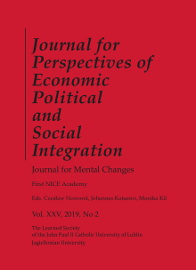From Career Decision-Making Towards Career Cruising – the Case of Hungary: the “U” Model
Abstract
This paper describes the changing role, practice and institutional setting of career guidance and counselling in Hungary from the 1950s to the present time. The article defines the relation between the institutional settings (polity), changes in the content of guidance policies implemented in those decades (policy), and decision-making processes (politics). It is argued that the lack of institutional resilience and the vagueness of the career guidance theoretical models created a relatively unstable guidance system in Hungary. Our description concerns both the theoretical development of guidance and counselling and legislative and institutional changes. It addresses the changing role of career guidance and counselling, including access to guidance service, and the changing perception of the two manifested by citizens, companies and politicians.
References
Arthur, M. B., & Rousseau, D. M. (1996). The boundaryless career. New York, NY: Oxford University Press.
Benedek, A. (2006, April). Career guidance and counselling in Hungary. Paper prepared for the Third International Symposium on Career Development and Public Policy, Sydney, Australia.
Berend, T. I. (1990). The Hungarian economic reform 1953–1988. Cambridge, England: Cambridge University Press.
Borbély-Pecze, T. B. (2017). The system and policy of lifelong guidance in Hungary. Budapest, Hungary: John Wesley Publisher.
Borbély-Pecze, T. B. (Ed.). (2018). The history of the Hungarian Public Employment Service in narratives (1991–2016). Budapest, Hungary: Ministry for National Economy.
Csirszka, J. (1966). Pályalélektan. Budapest, Hungary: Gondolat.
European Centre for the Development of Vocational Training. (2005). Improving lifelong guidance policies and systems. Using common European reference tools. Luxembourg: Office for Official Publications of the European Communities. Retrieved from www.cedefop.europa.eu/files/4045_en.pdf
European Lifelong Guidance Policy Network. (2012). Lifelong guidance policy development: A European resource kit. University of Jyväskylä, Jyväskylä, Finland. Retrieved from http://www.elgpn.eu/publications/browse-by-language/english/ELGPN_resource_kit_2011-12_web.pdf
European Lifelong Guidance Policy Network. (2014). Progress report 2013–2014. University of Jyväskylä, Jyväskylä, Finland. Retrieved from http://www.elgpn.eu/publications/browse-by-language/english/elgpn-progress-report-2013-2014
Hall, D. T., & Associates. (1996). The career is dead – long live the career: A relational approach to careers. San Francisco, CA: Jossey-Bass.
Hughes, D. (2015). Lifelong Guidance System in Hungary: Evaluation of the Social Renewal Operational Programme Measure (SROP-2.2.2-12/1) 2012–2015. Institute for Employment Research, University of Warwick, Coventry, England. Retrieved from https://palyaorientacio.munka.hu/Files/Documents/Article/Evaluation%20of%20Hungarian%20LLG%20system_2012-15_FINAL.pdf
Jakson, C. (Ed.). (2013). ELGPN glossary. University of Jyväskylä, Jyväskylä, Finland. Retrieved from http://www.elgpn.eu/publications/browse-by-language/hungarian/az-europai-palyaorientacios-szakpolitikai-halozat-elgpn-szakszotara-elgpn-glossary
Lange, P. de, Driessen, P. P. J., Sauer, A. Bornemann, B., & Burger, P. (2013). Governing towards sustainability – Conceptualizing modes of governance. Journal of Environmental Policy and Planning, 15(3), 403-425.
Leung, A. S. (2008). The big five career theories. In J.A. Athanasou & R. Van Esbroeck (Eds.), International Handbook of Career Guidance (pp. 115-132). Dordrecht: Springer.
Organisation for Economic Co-operation and Development. (2004). Career guidance and public policy. Bridging the gap. Paris: OECD Publications. Retrieved from http://www.oecd.org/education/innovation-education/34050171.pdf
Palonen, K. (2003). Four times of politics: policy, polity, politicking and politization. Alternatives, 28, 171-186.
Rókusfalvy, P. (1969). Pályaválasztás, pályaválasztási érettség. Budapest, Hungary: Tankönyvkiadó.
Ritoók, M. (2008). Pályafejlődés, pályafejlődási-tanácsadás. Budapest, Hungary: ELTE Publishing.
Sultana, R. G., & Zelloth, H. (2003). Review of career guidance policies in 11 acceding and candidate countries. Synthesis Report, July 2003. Turin: European Training Foundation. Retrieved from https://www.um.edu.mt/__data/assets/pdf_file/0006/39489/ETF-report.pdf
Sultana, R. (2009). Career guidance policies: Global dynamics, local resonances (ICeGS occasional paper). University of Derby, Derby, England.
Savickas, M. L. (2008). Helping people choosing jobs: a history of the guidance profession. In J. A. Athanasou & R. van Esbroeck (Eds.), International Handbook of Career Guidance (pp. 97-113). Dordrecht: Springer. Retrieved from http://www.realtutoring.com/career/bigFiveTheory.pdf
Swanson, J. L., & Fouad, N. A. (1999). Career theory and practice. Learning through case studies. London, England: Sage.
Watts, A., & Borbély-Pecze, T. B. (2011). The development of a lifelong guidance system in Hungary. International Journal for Educational and Vocational Guidance, 11(1).17-28. DOI 10.1007/s10775-010-9187-7
Watts, A. G. (2002). Socio-political ideologies in guidance. In A. G. Watts, B. Law, J. Killeen, J. M. Kidd, & R. Hawthorn (Eds.), Rethinking career, education and guidance. Theory, policy and practice (pp. 225-233). London and New York: Routledge.

